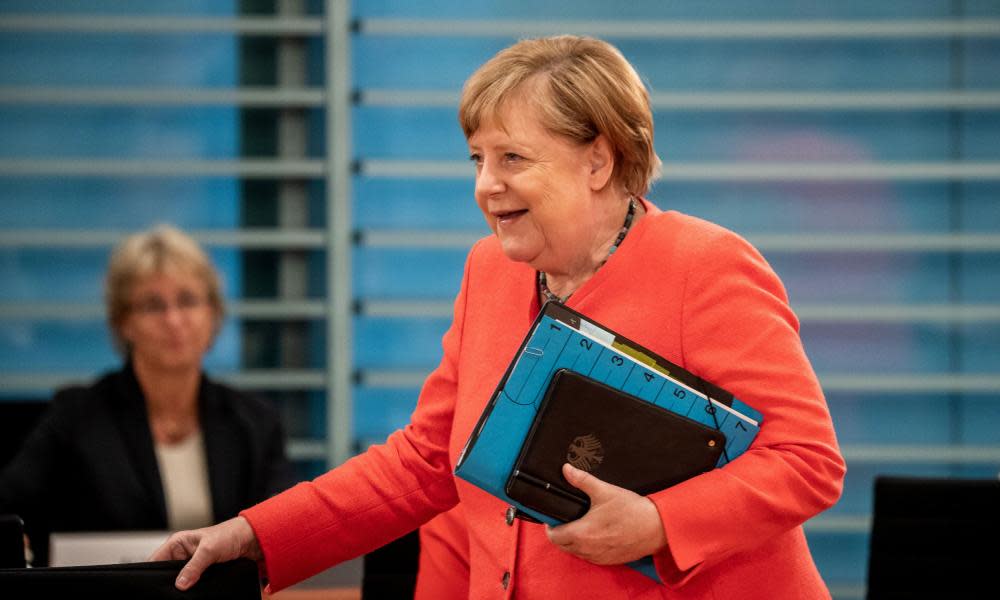Angela Merkel set for central role in talks on EU recovery plan

When Angela Merkel attended her first EU summit as Germany’s chancellor, in 2005, she joined Tony Blair, Jacques Chirac and leaders from central and eastern Europe that had joined the bloc only 17 months earlier. Nearly 15 years later, Merkel is the EU’s longest-serving leader and seen as the key to unlocking a deal to help Europe face the worst economic slump forecast in its history.
A year ago Merkel was seen as tired and drifting, having announced her intention to stand down as chancellor in 2021 after disastrous election results. Now credited for her calm leadership during the coronavirus pandemic, with personal approval ratings close to 80%, she is once again seen as the indispensable broker as EU leaders seek a recovery plan.
“Merkel was strengthened by coronavirus and by not being challenged inside her party,” said a senior EU diplomat. “I think that she is ready [to get a deal], she understands every small thing about the proposals.”
When EU leaders sit down together on Friday and Saturday, it will be their first face-to-face meeting since the pandemic struck. On the table is a €750bn (£680bn) draft recovery plan, as well as a proposed €1.074tn EU budget for the next seven years. Getting a deal on the budget will be fiendishly difficult as the EU attempts to square the circle of more spending on the environment, security and health and the €75bn shortfall caused by Brexit.
Daniela Schwarzer, the director of the German Council on Foreign Relations in Berlin, said Merkel would play a crucial role both because she was “so respected for her work” and because Germany was taking a middle position in the recovery plan, giving it a foot in both camps.
She said Germany had “a very strong commitment … to really invest heavily in the recovery of the EU,” but demands from northern countries to link funds to economic reform were “something that is very close to the German heart as well”.
Optimistic officials are encouraged by the coincidence that Germany took on the EU council’s rotating presidency on 1 July, amid sniping about the performance of the leaders of EU institutions. Charles Michel, the European council president, tasked with brokering a compromise, has been criticised by some for his handling of budget talks. “He is still paralysed by the failure of the European council in February,” said one senior EU diplomat.
An EU official responded that Michel had fully prepared for that February summit, but the task had not been easy as some EU leader were unprepared to compromise. “Since then we have had a global pandemic landing on our doorstep and the world has changed completely.”
Germany opened the way to a recovery plan with its own political conversion, enshrined in the deal Merkel struck with France’s Emmanuel Macron for a fund based on grants to countries hardest hit by coronavirus. Pierre Sellal, who spent a decade as France’s most senior diplomat in Brussels, said Merkel had crossed two of Germany’s traditional red lines; “The first, no deficits, no common borrowing. And secondly, no transformation of the rules underpinning in the single currency, no budgetary transfers.”
The Germany presidency could crystallise a consensus, he said. “Now we are at a very particular moment, the stakes are very high.”
Germany’s readiness to accept large-scale EU borrowing contrasts with the stance Merkel took during the eurozone debt crisis, when she stood firmly against a transfer union. The German government “realised that its own approach doesn’t allow the necessary convergence and cohesion in the EU,” said Schwarzer, who highlighted the role of Germany’s Social Democrat finance minister, Olaf Scholz, as architect of the policy shift. Schwarzer said Germany’s change of heart was “not out of some kind of abstract idea of solidarity – but it’s really in Germany’s self-interest to do so.”
Since Brexit and the election of Donald Trump in the US – two hammer blows to the European project – all EU leaders have become more aware of their economic interdependence and the risks of the European single market unravelling. “Thanks to Brexit … suddenly the leaders say we will defend the single market,” said a second senior EU diplomat, who also cited Trump and tensions in the EU-China relationship. As political frost descends on global trade, what was once seen as Germany’s strength, its export-led economy, suddenly looked more like a vulnerability.
Merkel’s change of heart has weakened the “frugal four”, a quartet of northern European states that want less EU spending and more budget discipline. For months, Germany had been perceived as an unofficial member. Now they stand more isolated.
But EU officials caution that Germany’s policy shift is not enough for agreement, as the frugal four continue to insist on tough conditions for loans that southern European governments reject as unacceptable. “Even having the Franco-German proposal is not always helpful, said one official. “We are playing chess on many different levels.” The Dutch prime minister, Mark Rutte, shop steward of the frugal four, said on Tuesday he was “not hopeful” of a deal.
The other big obstacle comes from the leader second only to Merkel in years running his country: Viktor Orbán. Hungary’s prime minister is resisting plans to tie the disbursement of EU funds to the rule of law, a key demand for western European governments alarmed about the weakening of democratic checks and balances in Hungary. Orbán got a symbolic boost from lawmakers in his Fidesz party this week who passed a resolution declaring that EU funds should not be linked to “political or ideological conditions – under the label of rule of law”.
Solving this political Rubik’s cube is now bound up with the political legacy of the German chancellor, who told MEPs this month: “The top priority in the Germany presidency will be unity in Europe.”

 Yahoo News
Yahoo News 
